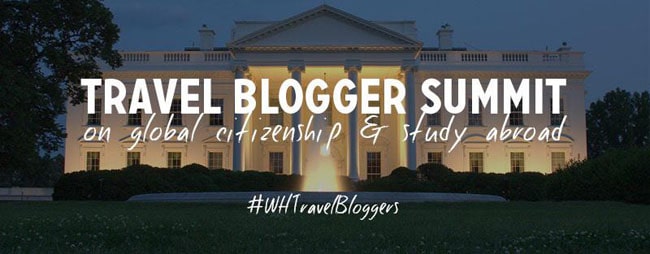
Shannon Green, from the National Security Council, came and went from the briefing I was in at the White House yesterday. She and other senior members of the Obama administration took time from dealing with pressing issues like ISIS to address a collection of travel bloggers and travel influencers about the importance of study abroad. As she expressed it, even in the middle of the many pressures on the executive branch, you still need to keep an eye on the “long game”.
The Long Game
The long game in this case is a belief that as Americans study or serve abroad their interactions with other cultures broaden the diplomacy of the U.S. in ways that diplomats can’t always do. The bonds that they form in other countries can help people abroad see the United States in a different light, through its greatest resource, its people.
Denis McDonough, the White House Chief of Staff, like most of the administration officials who spoke at yesterday’s “White House Travel Bloggers Summit on Study Abroad and Global Citizenship”, studied abroad himself in Spain at a time that America was going to war in Gulf War I. Now a father, his kids are attending a language immersion school with a goal that “when they come out the back end they are better able to compete in an international marketplace.”
The international marketplace is part of the message that the administration was trying to convey. Even the most American of brands Coke has chosen its last 4 CEOs from other countries because a global perspective is important to the company. A global perspective is good for American competitiveness, good for our relations with other countries and necessary to create an informed citizenry in this increasingly global world.
The Problem
50% of incoming college freshman express a desire to study abroad but only 10% do so by graduation. Numerous factors keep students from studying abroad. The cost of the experience, problems around financial aid, and fear all can prevent someone who is interested from pursuing it. Some, especially minority students, don’t even see it as a possibility. Minority students are therefore underrepresented in students who study abroad.
Of the students who do study abroad 55% of them travel to Europe. While this is down from 65% a decade a go the administration would like to see more students choose less traditional destinations like Sub-Saharan Africa, Southeast Asia and Latin America according to Benjamin Rhodes from the National Security Council.
Rhodes told us that some Malaysian residents he met said that before meeting American students when they thought of the United States they only thought of drones and a war in the Middle East. The White House would like to see more students study abroad, a more diverse group of students study abroad and would like to see them experience a more diverse group of countries.
The Approach
With “over 100” different programs that can help americans study or serve abroad it has sometimes been difficult to even know the options. To help get out the word about programs like the Gilman Scholarship Program, which aims to diversify who studies abroad and where they go, the White House announced the creation of a new Office of Study Abroad. This new office can coordinate and promote various related programs.
Some policy changes have been made to increase international relations like an agreement with China extending student visas from 1 year to 5 years and business visas from 1 year to 3 years,
Current Peace Corps Director Carrie Hessler-Radelet was in attendance to remind people that this program, which anyone can afford, is still an option for service abroad. Changes have been made in the Peace Corps to decrease the application process from 8 hours to 1 hour, to improve the speed of the selection process and to allow people to volunteer in a country of their choice.
Hessler-Radelet herself is part of a 4th generation Peace Corp family. Nothing can convey the culture of the U.S. better than living and working with others for a long period of time. The impact of these relationships will not always be what we would expect. She told us the story of a young couple who served for two years teaching in Malawi. As they prepared to leave one quiet boy in the young man’s class came to tell him, “Mr Vic, you taught us math and you taught us science and that was great but one thing I want to tell you. I saw the way you treat your wife, and when I grow up I want to treat my wife that way.”
A Personal Note
Unlike most of the presenters and attendees at the summit, I never studied abroad. While most students who study abroad do so their junior year, I was a bit busy getting married in the middle of the Fall semester. It was our hope that our kids would take advantage of a study abroad opportunity and our daughter did study abroad for a semester in Geneva. Many of her classmates chose Geneva because of the UN presence in the city and the numerous NGOs which are also based there. She now has friends who are all over the world and who are trying to improve it. It was an experience that, I suspect, she will look back on as a formative one.
Conclusion
If I had to condense the 3 hours of policy discussions into one sentence it would be that studying abroad or serving abroad is good for you, good for your country and that the government wants to help you do it.
presenters at the summit included:
From the U.S. Government:
- Benjamin Rhodes – Assistant to the President and Deputy National Security Advisor for Strategic Communications and Speechwriting, National Security Council
- Evan Ryan – Assistant Secretary of State for Educational and Cultural Affairs (ECA), Department of State
- Denis McDonough – Chief of Staff, The White House
- Bernadette Meehan – Senior Director for Strategic Communications & NSC Spokesperson, National Security Council
- Jonathan Greenblatt – Special Assistant to the President and Director, Office of Social Innovation & Civil Participation, The White House
- Penny Pritzker – Secretary of Commerce, Department of Commerce
- Carrie Hessler-Radelet – Director, Peace Corps
- Tina Tchen – Assistant to the President and Chief of Staff to the First Lady, The White House
- Shannon Green – Senior Director for Global Engagement, National Security Council
From the private sector:
- Patrick Dowd – CEO, Millennial Trains Project & Editor at Large, National Geographic
- Daniela Kaisth – Vice President, External Affairs and IIE Initiatives, Institute of International Education
- Paula Froelich – Editor in Chief, Yahoo Travel
- Amex Montoya – Alumnus, Benjamin A. Gilman Scholarship Program
- Dr Angel Cabbrera – President, George Mason University
- Samantha Brown – Television Host, Travel Channel
- Robert Reid – Digital Nomad, National Geographic
- Robin Goldberg – Chief Experience Officer, Minerva Project
- James Howard – Program Director / National iHeartRadio Brand Coordinator, iHeartMedia
- Don Wildman – Television Host, Travel Channel
Sponsors of the event included: Hosteling International, Turkish Airlines, Travel Channel, Hyperactive, iHeartMedia, The Newseum, Minerva, W Washington D.C., Capital File Magazine, Baron Tours, Marriott International, Millennial Train, Yahoo Travel, and National Geographic
- Search for Great Tours HERE
- Buy Travel Insurance
- Get a Car Rental
- Book Your Accommodation HERE
+Chris Christensen | @chris2x | facebook
7 Responses to “The Obama White House Wants You To Study Abroad”
Leave a Reply
Tags: article, student travel, study abroad, white house

 6 Reasons to Skip Europe when Studying Abroad
6 Reasons to Skip Europe when Studying Abroad Learn to Bodysurf Like President Obama
Learn to Bodysurf Like President Obama Traveling Abroad with Type 1 Diabetes
Traveling Abroad with Type 1 Diabetes The Problem Using American Credit Cards Abroad
The Problem Using American Credit Cards Abroad

Sherry Ott
Says:December 11th, 2014 at 1:56 pm
Was so sad that I didn’t get to attend – sounds like it would have been a good discussion. Thanks for the recap – I”m sending it along to my nieces! Hope you had a fun time!
chris2x
Says:December 11th, 2014 at 2:02 pm
Hard not to have fun with that group
SakhiVyas
Says:December 11th, 2014 at 2:34 pm
Great article on #StudyAbroadBecause http://t.co/LmzS2gUM8H
Jerrol
Says:December 11th, 2014 at 3:56 pm
What a wonderful opportunity Chris. It’s heartwarming to know the government is thinking in lines of Americans becoming more internationally savvy.
chris2x
Says:December 11th, 2014 at 4:58 pm
now we have to see if the rest of America is up for it
Ed in Seatte
Says:March 31st, 2015 at 6:21 pm
Great! Now show me the money!
Sean parson
Says:June 8th, 2015 at 12:27 am
Well that’s good and sound interesting. Of course USA and rest all country will be getting benefit from this. USA will have a chance to mint more money and other country will have opportunity to study there.